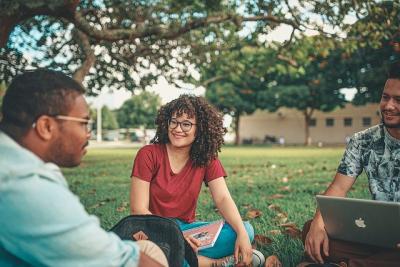Below is the list of demos that took place at CW15. Due to the demand for slots (and all the cool technology and advice on offer) we had two sessions each of 25 minutes in length.
Each session consisted of 5-10 minutes of presentations and 15 minutes of more of discussions. Attendees were encouraged to ask questions and enquire about how they could use the approach, tools etc - these session had a focus on being interactive.
Session 1
1. Data Management Plan Online (slides available)
From the DCC http://dmponline.dcc.ac.uk and the Software Management Plan Service Prototype (from the Institute -https://tinyurl.com/ssi-smpservice) - online tools to help you write you plan. Marta Ribeiro and Mike Jackson.
Further information:
- DMPonline: https://dmponline.dcc.ac.uk/
- DMP guidance, tools and resources: http://www.dcc.ac.uk/resources/data-management-plans
- GitHub: https://github.com/DigitalCurationCentre/DMPonline_v4
- User group: http://www.jiscmail.ac.uk/DMPONLINE-USER-GROUP
- Twitter: @digitalcuration, #DMPonline
- Software Management Plan Service Prototype: https://ssi-dev.epcc.ed.ac.uk/
- Writing software management plans: https://www.software.ac.uk/resources/guides/software-management-plans
- GitHub: https://github.com/softwaresaved/smp-service (smp-docs and smp-prototype branches)
- Twitter: @softwaresaved
2. Research Objects (slides available)
www.researchobject.org - learn how to package up your experimental artifacts to improve reproducibility - Matthew Gamble.
3. Dawn Science
Python coding, analysis and visualisation for research facilities and facility users - Mark Basham.
Further information:
- Main Web Page - http://www.dawnsci.org/
- Latest Download - http://www.dawnsci.org/downloads
- YouTube Channel - https://www.youtube.com/user/DAWNScience
- Twitter page - https://twitter.com/DAWNScience
4. Successful Bioinformatics software (slides available)
General challenges facing biologists/biology; good design of systems and examples of successful software - Yannick Wurm.
Further information:
- SequenceServer: An success-story of user-centric design for bioinformatics [http://sequenceserver.com]
- GeneValidator: Identify problems with gene predictions http://wurmlab.github.io/tools/genevalidator/
- Afra: Crowd-sourcing the visual inspection and correction of gene feature predictions by improving teaching experience [http://afra.sbcs.qmul.ac.uk]
- Bionode: Bioinformatics streams for big data [http://bionode.io]
- OSwitch: (docker made easy): access complex software in just one command. [ https://github.com/yeban/oswitch ]
Session 2:
1. The Apache Taverna workflow system and the SEEK platform (slides available)
Science with workflows and supporting collaborative research - Alan Williams.
2. Stan (slides available)
Stan and it’s support for reproducible statistical analysis - Michael Betancourt.
3. Paper Hackathons (slides available)
How to bring together researchers and developers to produce papers - this will be a how-to session. - Derek Groen.
Further information:
If you would like to plan your own paper Hackathon then Derek kindly prepared this set of questions that should help with the planning.
4. Getting started with Bionode (slides available)
Bionode and how to collaborate on the project - Bruno Viera.
Further information:
- Bionode documentation - doc.bionode.io
- Bionode related ideas from CW15 - bit.ly/biocw15
- Bionode on GitHub - github.com/bionode/bionode
- Accessing & processing data via RAM efficient streaming - dat-data.com

